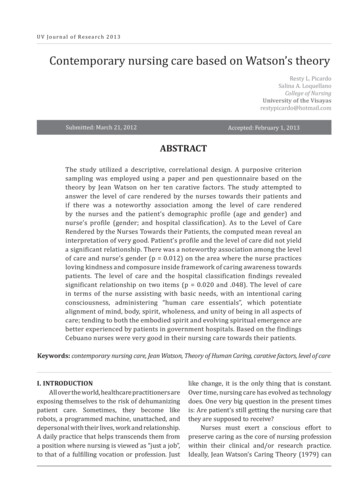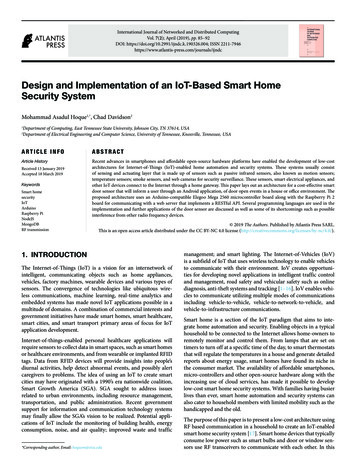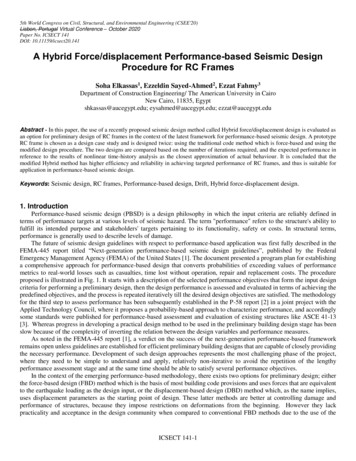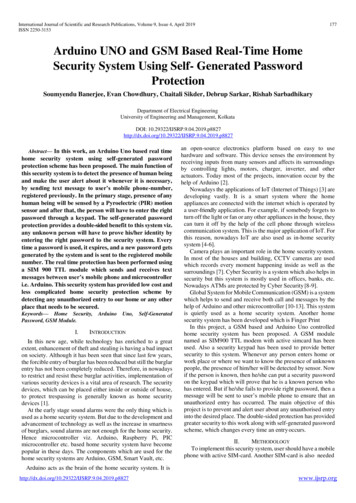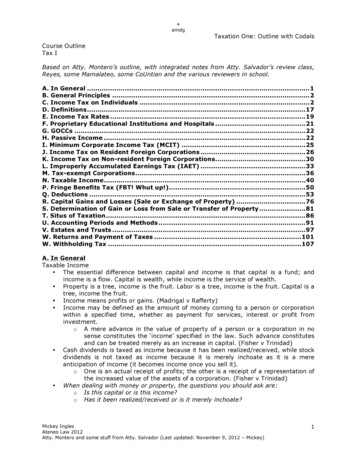
Transcription
amdgTaxation One: Outline with CodalsCourse OutlineTax IBased on Atty. Montero’s outline, with integrated notes from Atty. Salvador’s review class,Reyes, some Mamalateo, some CoUntian and the various reviewers in school.A. In General . 1B. General Principles . 2C. Income Tax on Individuals . 2D. Definitions . 17E. Income Tax Rates . 19F. Proprietary Educational Institutions and Hospitals . 21G. GOCCs . 22H. Passive Income . 22I. Minimum Corporate Income Tax (MCIT) . 25J. Income Tax on Resident Foreign Corporations . 26K. Income Tax on Non-resident Foreign Corporations. 30L. Improperly Accumulated Earnings Tax (IAET) . 33M. Tax-exempt Corporations . 36N. Taxable Income . 40P. Fringe Benefits Tax (FBT! Whut up!) . 50Q. Deductions . 53R. Capital Gains and Losses (Sale or Exchange of Property) . 76S. Determination of Gain or Loss from Sale or Transfer of Property . 81T. Situs of Taxation . 86U. Accounting Periods and Methods . 91V. Estates and Trusts . 97W. Returns and Payment of Taxes . 101W. Withholding Tax . 107A. In GeneralTaxable Income The essential difference between capital and income is that capital is a fund; andincome is a flow. Capital is wealth, while income is the service of wealth. Property is a tree, income is the fruit. Labor is a tree, income is the fruit. Capital is atree, income the fruit. Income means profits or gains. (Madrigal v Rafferty) Income may be defined as the amount of money coming to a person or corporationwithin a specified time, whether as payment for services, interest or profit frominvestment.o A mere advance in the value of property of a person or a corporation in nosense constitutes the ‘income’ specified in the law. Such advance constitutesand can be treated merely as an increase in capital. (Fisher v Trinidad) Cash dividends is taxed as income because it has been realized/received, while stockdividends is not taxed as income because it is merely inchoate as it is a mereanticipation of income (it becomes income once you sell it).o One is an actual receipt of profits; the other is a receipt of a representation ofthe increased value of the assets of a corporation. (Fisher v Trinidad) When dealing with money or property, the questions you should ask are:o Is this capital or is this income?o Has it been realized/received or is it merely inchoate?Mickey InglesAteneo Law 2012Atty. Montero and some stuff from Atty. Salvador (Last updated: November 9, 2012 – Mickey)1
amdgTaxation One: Outline with CodalsB. General PrinciplesSEC. 23. General Principles of Income Taxation in the Philippines. - Except when otherwise provided in this Code:(A) A citizen of the Philippines residing therein is taxable on all income derived from sources within and without thePhilippines;(B) A nonresident citizen is taxable only on income derived from sources within the Philippines;(C) An individual citizen of the Philippines who is working and deriving income from abroad as an overseas contractworker is taxable only on income derived from sources within the Philippines: Provided, That a seaman who is acitizen of the Philippines and who receives compensation for services rendered abroad as a member of thecomplement of a vessel engaged exclusively in international trade shall be treated as an overseas contract worker;(D) An alien individual, whether a resident or not of the Philippines, is taxable only on income derived from sourceswithin the Philippines;(E) A domestic corporation is taxable on all income derived from sources within and without the Philippines; and(F) A foreign corporation, whether engaged or not in trade or business in the Philippines, is taxable only on incomederived from sources within the Philippines.Who are taxable on income derived from all sources, whether within or outside thePhilippines? Taxed worldwide!1. Resident citizens.2. Domestic corporations. The other kinds of taxpayers are subject to tax only on income derived fromPhilippine sources.Citizenship & ResidencyResident CitizenNon-resident CitizenOverseas Contract WorkerResident AlienNon-resident AlienDomestic CorpForeign CorpTaxable IncomeInside RPYesYesYesYesYesYesYesTaxable IncomeOutside RPYesNoNoNoNoYesNoC. Income Tax on IndividualsDefinitionsResident citizens and resident aliensSection 22 (F) The term "resident alien" means an individual whose residence is within the Philippines and who isnot a citizen thereof. Resident alien is an individual:1. Whose residence is within the Philippineso Must be actually present in the Philippines for more than 12 months from hisarrival2. Who is not a citizenMere physical or body presence is enough. Not intention to make the country one’sabode. (Garrison v CA)An alien actually present in the Philippines who is not a mere transient or sojourner is aresident of the Philippines for purposes of the income tax. Whether he is a transient ornot is determined by his intentions with regard to the length and nature of his stay.o A mere floating intention indefinite as to time, to return to another country is notsufficient to constitute him a transient.o If he lives in the Philippines and has no definite intention as to his stay, he is aresident. One who comes to the Philippines for a definite purpose which in itsnature may be promptly accomplished is a transient. But if his purpose is of such a nature that an extended stay may benecessary for its accomplishment, and to that end the alien makes hisMickey InglesAteneo Law 2012Atty. Montero and some stuff from Atty. Salvador (Last updated: November 9, 2012 – Mickey)2
amdgTaxation One: Outline with Codalshome temporarily in the Philippines, he becomes a resident, though it maybe his intention at all times to return to his domicile abroad when thepurpose for which he came has been consummated or abandoned. (RR 2)Non-resident citizensSec 22 (E). The term "nonresident citizen" means:(1) A citizen of the Philippines who establishes to the satisfaction of the Commissioner the fact of his physicalpresence abroad with a definite intention to reside therein.(2) A citizen of the Philippines who leaves the Philippines during the taxable year to reside abroad, either as animmigrant or for employment on a permanent basis.(3) A citizen of the Philippines who works and derives income from abroad and whose employment thereat requireshim to be physically present abroad most of the time during the taxable year.(4) A citizen who has been previously considered as nonresident citizen and who arrives in the Philippines at anytime during the taxable year to reside permanently in the Philippines shall likewise be treated as a nonresidentcitizen for the taxable year in which he arrives in the Philippines with respect to his income derived from sourcesabroad until the date of his arrival in the Philippines.(5) The taxpayer shall submit proof to the Commissioner to show his intention of leaving the Philippines to residepermanently abroad or to return to and reside in the Philippines as the case may be for purpose of this Section. Meaning of non-resident citizen:1. Citizen who establishes to the satisfaction of the Commissioner the fact of hisphysical presence abroad with a definite intention to reside therein2. Citizen who leaves the Philippines during the taxable year to reside abroad, eitheras an immigrant or for employment on a permanent basis3. Citizen who works and derives from abroad and whose employment thereatrequires him to be physically present abroad most of the time during the taxableyear4. Citizen who has been previously considered as nonresident citizen and whoarrives in the Philippines at any time during the taxable year to residepermanently in the Philippines shall likewise be treated as a nonresident citizenfor the taxable year in which he arrives in the Philippines with respect to hisincome derived from sources abroad until the date of his arrival in thePhilippines.Who are non-resident citizens? (RR 1-79)1. Immigrant – one who leaves the Philippines to reside abroad as an immigrant forwhich a foreign visa has been secured2. Permanent employee – one who leaves the Philippines to reside abroad foremployment on a more or less permanent basis3. Contract worker – one who leaves the Philippines on account of a contract ofemployment which is renewed from time to time under such circumstance as torequire him to be physically present abroad most of the time (not less than 183days)Non-resident citizens who are exempt from tax with respect to income derived fromsources outside the Philippines shall no longer be required to file information returnsfrom sources outside the Philippines beginning 2001. (RR 5-2001)The phrase “most of the time” shall mean that the said citizen shall have stayed abroadfor at least 183 days in a taxable year. The same exemption applies to an OCW but as such worker, the time spent abroad isnot material for tax exemption purposes all that is required is for the worker’semployement contract to pass through and be registered with the POEA. (BIR Ruling33-2000).Non-resident aliens engaged in business in the PhilippinesSec 22. (G) The term "nonresident alien" means an individual whose residence is not within the Philippines andwho is not a citizen thereof.Mickey InglesAteneo Law 2012Atty. Montero and some stuff from Atty. Salvador (Last updated: November 9, 2012 – Mickey)3
amdg Taxation One: Outline with CodalsWho are non-resident aliens?1. An individual whose residence is not within the Philippines2. Not a citizen of the Philippineso Determination is by his intention with regard to the length and nature of his stay.(Sec 5, RR 2)o Alien can either: Be deriving income in the Philippines, or Stays in the Philippines for more than 180 days during any calendar year(deemed to be a non-resident alien engaged in the Philippines)Loss of residence by alieno An alien who has acquired residence in the Philippines retains his status until heabandons the same and actually departs from the Philippines.o A mere intention to change his residence does not change his status. An alien whohas acquired a residence is taxable as a resident for the remainder of his stay in thePhilippines. (Sec. 6, RR 2)Minimum wage earnerSec 22. (GG) The term ‘statutory minimum wage’ earner shall refer to rate fixed by the Regional Tripartite Wageand Productivity Board, as defined by the Bureau of Labor and Employment Statistics (BLES) of the DOLE.(HH) The term ‘minimum wage earner’ shall refer to a worker in the private sector paid the statutory minimumwage; or to an employee in the public sector with compensation income of not more than the statutory minimumwage in the non-agricultural sector where he/she is assigned. Fixed by the Regional Tripartite Wage and Productivity Board.Minimum wage earner:o Private sector – paid the statutory minimum wageo Public sector – not more than the statutory minimum wage in the nonagricultural sector where he/she is assignedDependentSec 35. (B) For purposes of this Subsection, a "dependent" means a legitimate, illegitimate or legally adopted childchiefly dependent upon and living with the taxpayer if such dependent is not more than twenty-one (21) years ofage, unmarried and not gainfully employed or if such dependent, regardless of age, is incapable of self-supportbecause of mental or physical defect. Dependent is a o Legitimate, illegitimate or legally adopted child, living with the taxpayer, andchiefly dependent upon the taxpayero Who must be: Not more than 21, Unmarried, and Not gainfully employed, OR Dependent, regardless of age, is incapable of self-support because ofmental or physical defect.To summarize, individual taxpayers are classified into:1. Citizens, who are divided into:o Resident citizens – those citizens whose residence is within the Philippines; ando Non-resident citizens – those citizens whose resident is not within the Philippines.2. Aliens, who are divided into:o Resident aliens – those individuals whose residence is within the Philippines andare not citizens thereof; andMickey InglesAteneo Law 2012Atty. Montero and some stuff from Atty. Salvador (Last updated: November 9, 2012 – Mickey)4
amdgoTaxation One: Outline with CodalsNon-resident aliens – those individuals whose residence is not within thePhilippines but temporaril
General Principles of Income Taxation in the Philippines. - Except when otherwise provided in this Code: (A) A citizen of the Philippines residing therein is taxable on all income derived from sources within and without the Philippines; (B) A nonresident citizen is taxable only on income derived from sources within the Philippines; (C) An individual citizen of the Philippines who is working .







